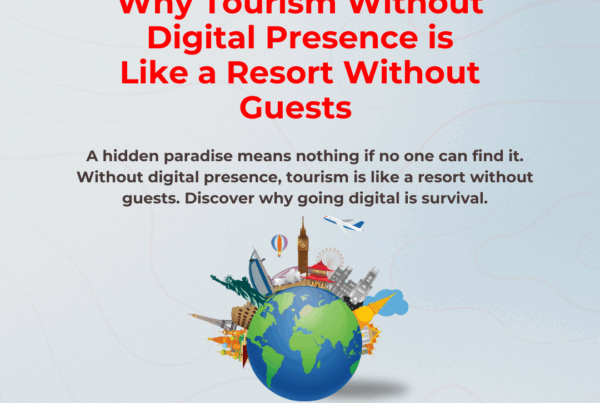A robust online presence is no longer a luxury for travel agencies – it’s a necessity. Potential clients are increasingly turning to search engines to research and book their dream vacations. This means if your travel agency website isn’t optimized for search engines (SEO), you’re missing out on a massive pool of qualified leads.
Are you worried that you have no experience as a webmaster, fear not! Mastering SEO for Tours and Travel Websites isn’t rocket science. By implementing a few key strategies, you can significantly increase your website’s visibility and attract a steady stream of customers who are eager for travel and adventure. Here, we’ll unveil 5 powerful tricks to propel your travel agency website to the top of search engine results pages (SERPs).
Trick #1: Keywords – The Language of Your Ideal Clients
Think of keywords as the magic words that potential clients use to find travel agencies like yours. The first step in your SEO journey is to identify the right keywords – those that resonate with your target audience.
Next is to classify your keywords by establishing client intent, search volume, and the cost per click of each keyword. This gives you an idea of the keywords with the most monetary value.
Lastly, split your pool of keywords into different categories. You can use some keywords to go into the website copy or some keywords for your blogs. It is not uncommon for keywords in the website copy to overlap with target keywords within your blogs, don’t stress you are on the right track.
Do not shy away from long-tail keywords
While generic keywords like “travel agency” might seem tempting, they’re highly competitive and often yield less qualified leads. Instead, focus on long-tail keywords that are more specific and have a higher conversion rate. Think “family adventure tours to Masai Mara” or “honeymoon packages in Mombasa.”
Tools for keyword research
- Google Keyword Planner: This free tool by Google provides insights into search volume, competition, and related keyword suggestions.
- SEMrush: A powerful keyword research tool offering detailed metrics on keyword difficulty, competition level, and organic search volume.
- Ahrefs: Another industry-leading keyword research tool with features like keyword difficulty score and click-through rate (CTR) estimations.
Pro Trick: Partner with a Tours and Travel SEO Agency
For in-depth keyword research tailored to the travel industry, consider collaborating with a Tours and Travel SEO Agency. These experts possess a deep understanding of travel-related search trends and can help you identify high-value, low-competition keywords that attract your ideal clients.
Trick #2: Content – Craft Compelling Website Copy
Once you have your keyword arsenal, it’s time to weave them into compelling website content. High-quality content not only informs and engages potential clients but also signals relevance to search engines.
Content strategies that convert leads into clients
- Destination-Specific Landing Pages: Create dedicated landing pages for each destination you offer, optimizing them with relevant keywords and captivating descriptions. Highlight the unique experiences, attractions, and cultural immersion each destination provides.
- Travel Blogs: Establish yourself as a travel authority by creating a blog section featuring informative and engaging content. Share destination guides, travel tips, cultural insights, and exciting travel stories.
- Testimonials and Reviews: Showcase positive client testimonials and reviews on your website. Social proof builds trust and increases conversion rates.
Remember: Content should be informative, engaging, and optimized for your target keywords.
Trick #3: Technical SEO – The Foundation of a Search-Engine Friendly Website
While compelling content is crucial, a website’s technical foundation plays a vital role in SEO success. Here are some key technical SEO aspects to focus on:
- Mobile Optimization: Ensure your website offers a flawless user experience across all devices, especially mobile phones.
- Website Speed: Slow loading times can significantly hurt your SEO ranking and user experience. Optimize images, minimize code bloat, and consider a reliable content delivery network (CDN) for faster loading speeds.
- URL Structure: Utilize clear and descriptive URLs that incorporate relevant keywords and accurately reflect the page content.
- Schema Markup: Implement schema markup, which provides search engines with additional context about your website and content, potentially leading to richer search results.
Pro Trick: Partner with a Tours and Travel Digital Marketing Agency
Technical SEO can be complex to maneuver around. If you’re not comfortable tackling it yourself, consider partnering with a Tours and Travel Digital Marketing Agency. CHARLESON® digital marketing experts specialize in optimizing travel agency websites for search engines, ensuring you reap the benefits of a technically sound foundation.
Trick #4: Backlinks – Building Authority in the Travel Industry
Backlinks (links from other websites to yours) act as a vote of confidence in your website’s authority and relevance. The more high-quality backlinks you have, the higher your ranking on search engine results pages.
Strategies for Building Backlinks
- Guest Blogging: Contribute informative and engaging travel-related articles to reputable travel blogs and websites. Ensure these websites are relevant to your target audience and have a good domain authority.
- Industry Directories: Submit your travel agency listing to relevant online directories and travel association websites.
- Social Media Promotion: Share your blog posts and website content on social media platforms. Encourage engagement and build relationships with travel influencers and bloggers who might be willing to share your content.
Pro Trick: Quality Over Quantity – Focus on Earning Backlinks from Reputable Websites
While the number of backlinks you have plays a role, the quality is even more important. Seek backlinks from high-authority websites within the travel industry that resonate with your target audience.
Trick #5: Social Media – Build Brand Awareness and Community
Social media is a powerful tool for travel agencies to connect with potential clients, build brand awareness, and drive traffic to your website.
Strategies for Social Media Success
- Platform Selection: Choose the social media platforms where your target audience spends their time. Popular options for travel agencies include Instagram, Facebook, Pinterest, and YouTube.
- Compelling Content is Key: Share visually stunning travel photos, short travel videos, destination guides, travel tips, and behind-the-scenes glimpses of your agency.
- Run Contests and Promotions: Engage your audience by running contests and promotions on social media. Offer exciting travel packages or experiences as prizes.
- Influencer Marketing: Partner with tours and travel influencers to elevate your brand profile and have showcase your service catalogue of various destinations.
Pro Trick: Integrate Social Media with Your Website
Make it easy for visitors to share your website content on social media platforms. Utilize social media sharing buttons and consider creating social media-specific landing pages for targeted promotions.
Beyond the 5 Tricks: A Continuous Journey of Optimization
SEO is an ongoing process, not a one-time fix. Here are some additional tips to ensure long-term SEO success:
- Track Your Progress: Utilize website analytics tools like Google Search Console to monitor your website traffic, track keyword rankings, and identify areas for improvement.
- Stay Updated on SEO Trends: The SEO landscape is constantly evolving. Keep yourself informed about the latest algorithm updates and industry best practices.
- Embrace Local SEO: If you have a physical location, optimize your website for local search. Claim your Google My Business listing, encourage customer reviews, and target location-specific keywords.
In a nutshell
By implementing these 5 SEO tricks and ongoing optimization efforts, you can transform your travel agency website into a powerful lead generation machine. Attract dream clients, showcase your expertise, and become a trusted resource in the travel industry. Remember, SEO is a journey, not a destination.
Consider partnering with a Tours and Travel SEO Digital Marketing such as CHARLESON® Marketing Agency for expert guidance. With dedication and the right strategies, your travel agency website can become a beacon, guiding adventurous souls towards their dream vacations and propelling your business to new heights.




